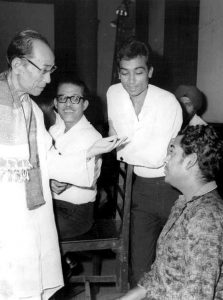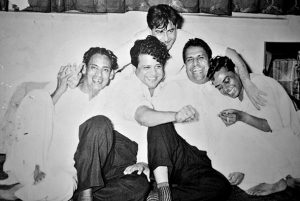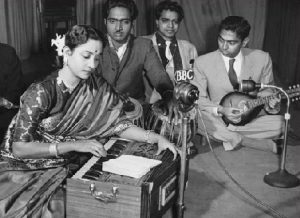Cinema has become an integral part of lives of people all over the world. Cinemas can bind people together irrelevant of their cast or creed; when we watch a film at the cinema hall we don’t see the religion, cast or culture of the person sitting beside. People sit together and laugh, cry and enjoy. Cinemas have the strength of giving strong messages. The music plays a very important role in cinemas. Music is not bound by any religion, language, it has no boundaries, and it binds people across the world.
American pianist Billy Joel once said: I think music in itself is healing. It’s an explosive expression of humanity. It’s something we are all touched by. No matter, what culture we’re from, everyone loves music. And even if the language is different, the thing we all relate and connect with is the soothing effect of music.

In a cinema when the composer and filmmaker theoretically agree on the end product of their work, we get a good film score, while their definitions of that may vary. The film industry globally has seen some long-term collaboration between producer-director-composer. These collaborations have produced many prolific movies and music. Some of the partnerships continued for decades, suggesting that both parties find great value in working with someone familiar rather than unfamiliar. We have heard of great friendship between some famous director-composer collaboration of Hollywood such as Steven Spielberg and John Williams, Maurice Jarre and David Lean, Alfred Hitchcock and Bernard Herrmann, George Fenton and Ken Loach have created the best of movies and music.
Lakhon hai yahan dilwale…..Kismat (1968) Music Director: O.P.Nayyar
Singer: Mahendra Kapoor
In Hindi cinema we have witnessed great friendship between composer-lyricist; the famous duo such as Majrooh Sultanpuri and S.D. Burman who not only shared a common birthday but also a musical awareness. This duo gave simple, common day expressions very delightful catchy tunes. There have been several other famous poet–composer teams like Shailendra- and Hasrat Jaipuri-Shankar Jaikishan, Raja Mehndi Ali Khan-Madan Mohan, and S. H. Bihari-O. P. Nayyar, and the great Jodi of Shakeel Badayuni-Naushad. In the 1980s, the great duo Gulzar-R.D.Burman has given mesmerising songs to the music world. Similarly some great directors loved working with composers who shared same vision; such as Salil Chowdhury and Hrishikesh Mukherjee, Basu Chatterjee and  R.D.Burman, Yash Chopra-Lakshmikant –Pyarelal, Bimal Roy –Shankar Jaikishan. These duos gave the music world some memorable songs of all hues and colours. Actors Dev Anand and Raj Kapoor turned producers and had their own banners – Navketan and R.K.Films. Dev Anand was loyally close to S.D.Burman and Raj Kapoor to Shankar Jaikishan.
R.D.Burman, Yash Chopra-Lakshmikant –Pyarelal, Bimal Roy –Shankar Jaikishan. These duos gave the music world some memorable songs of all hues and colours. Actors Dev Anand and Raj Kapoor turned producers and had their own banners – Navketan and R.K.Films. Dev Anand was loyally close to S.D.Burman and Raj Kapoor to Shankar Jaikishan.
Dil ki nazar se….Anari (1959) Music Director: Shankar Jaikishan,
Singers: Mukesh-Lata Mangeshkar
Music has eliciting power; it can draw emotional response from audience. Songs in a movie can shape a narrative, taking it to another level, and they can provide an internal structure to the plot. Some movies have become box office hits only because of the songs they had. The fact is the music is conceived as part of and for the purposes of supporting the film. Therefore, directors prefer composers and lyricists who understand their mind. The essence behind collaborations is making a movie memorable. It is near impossible to have a finished film that is one sole person’s creative efforts; it is always joint effort and team work. In fact, there are hundreds of collaborators leaving their footprint in a movie; from pre-production, script writing, casting, background music, production, set dressing, painting, wardrobe, make up to post-production work such as editing, colour correction, post-audio and of course, composing the music.
Mai zindagi ka saath nibhata chala gaya………. Hum Dono (1961)
Singer: Mohamed Rafi
Historically, it has been quite common for directors and composers to work together on projects consistently, especially after success from past projects. The value of building such a relationship is based the trust. Once a director knows that a composer can work to deadline and churn out a great finished product the more willing he/she is to let that composer stretch out creatively on his next film. When a director works with the same composer, the communication becomes easier, the process is understood and there is an understanding from the where the composer is coming musically. The famous Hollywood duo Bernard Herrmann and John Williams shared an interesting view on this relationship. They both felt that it is not the length of the relationship, but it is the quality. It goes like this: the trust and freedom that is granted to a composer by the director blossoms the musical art. The stronger the composer/director partnership the further the director can push the composer on the score. Perhaps, further than than they thought they would go. The partnership elevates both the director and composer.
The genius composer Jaidev was one of an underrated music composer who gave some of the most beautiful film scores and mesmerizing soundtracks and even though Sahir ludhiavi has worked with almost every legendary music composer of his era but there was something with his collaboration with Jaidev that cannot be described in words. They have only worked on 5 albums together and this is because Jaidev didn’t actually do many films in his career, but each and every song these two created together is unforgettable. Their music in ‘Hum Dono’ is widely considered as one of the greatest soundtracks of all time.
I want to make a special mention here of a lesser known but one of the prolific composer Kanu Roy. Roy was famous composers in Bengali films, but lesser known in Hindi film industry. Kanu Roy gave music for most of Basu Bhattacharya’s films. His major work was for films Uski Kahani (1966), Anubhav (1971), Avishkaar (1973) and Griha Pravesh (1979). Interestingly, Kanu Roy never used the voice of Lata Mangeshkar. Kanu Roy used Geeta Dutt’s voice for his songs. She has sung just a few songs for him, and they are the best songs in the history of Hindi cinema. All these songs of Kanu Roy have certain common factors like meaningful lyrics, minimum use of orchestra, use of Xylophone, deep rendition of the song by Geeta Dutt and an emotional bonding these songs share with the listener!













































